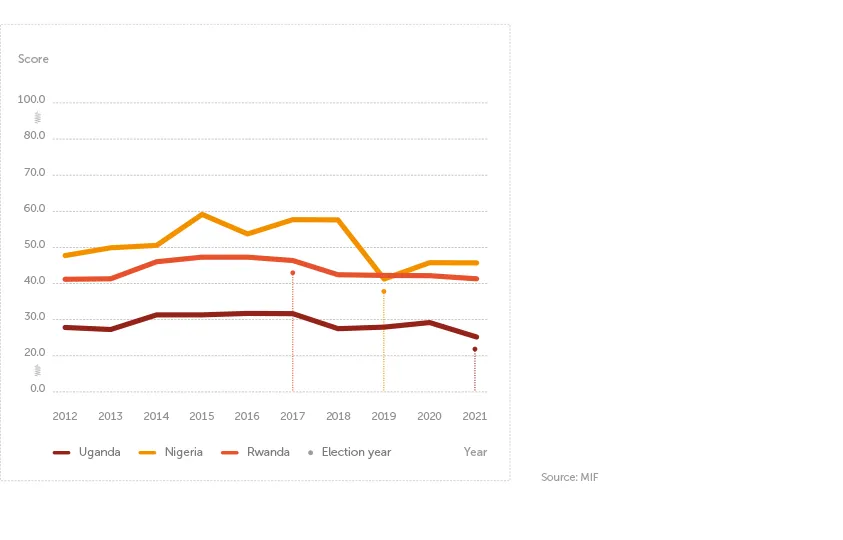Key democratic freedoms decline during election periods
06 June, 2023
In several African countries who have held elections between 2012-2021, the period in which the 2022 IIAG covers, there has been a concerning decline in key indicators of the IIAG sub-categories Participation and Rights in the year building up to the vote.
During periods when the electorate need their democratic rights and freedoms the most to make well informed decisions, they are often being infringed upon.
Selected African countries: Democratic Elections indicator scores (2012-2021)

Uganda: election year saw lowest score for Democratic Elections in a decade
The last presidential election in Uganda took place in 2021. The elections saw a concerning decline in democratic freedoms from an already low base. Freedom of Association & Assembly (-12.5) was Uganda’s most deteriorated indicator between 2020-2021. Unsurprisingly, the election year saw declines in Democratic Elections (-4.9) as well as Media Freedom (-6.4), Digital Rights (-2.2) and Political Pluralism (-3.1).
While the Democratic Elections indicator’s score has fluctuated throughout the decade, it reached a ten-year low of 25.0 in 2021. Barring 2021, the last election year in Uganda was 2016. With a score of 31.7, it was the peak score for free and fair elections in Uganda.
Nigeria: alarming decline in freeness and fairness of elections in build-up to vote
Between 2018 and 2019, the period building up to Nigeria’s 2019 elections, Nigeria’s most declined IIAG indicator was Democratic Elections (-16.8). Civil Society Space (-7.0) and Media Freedom (-6.3) were among Nigeria’s ten most deteriorated indicators across this period, while Digital Rights (2.1), Personal Liberties (-2.2) and Political Pluralism (-1.8) also declined.
With a score of 40.9, elections were at their least free and fair during the most recent election year. Before the 2019 elections, the last presidential election took place in 2015. With a score of 59.4, this was the highest score for the Democratic Elections indicator throughout the decade.
Rwanda: clampdown on liberties and digital rights in the year preceding election
Between 2016 and 2017, the year of the presidential election, Rwanda’s score in the Democratic Elections indicator had decreased (-1.0).
Concurrently, in the lead-up to the election (2016-2017) other key indicators such as Personal Liberties and Digital Rights had been Rwanda’s fourth and fifth most declined indicators for this period, respectively. In the year following the election, key indicators for elections further declined. Most notably Freedom of Expression & Belief was Rwanda’s most deteriorated IIAG indicator between 2017 and 2018 (-6.0). Democratic Elections (-4.1) and Media Freedom (-2.4) also registered declines in that same period.
In contrast to others, Rwanda’s scores have not rebounded following the election year. Instead, scores have continued to decline, suggesting a more long-term trend towards anti-democratic measures.


